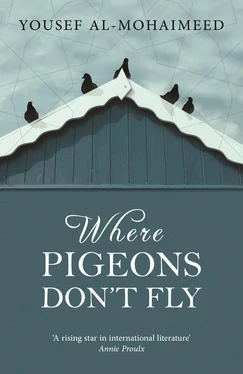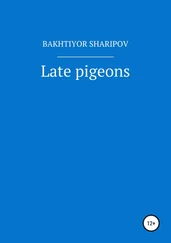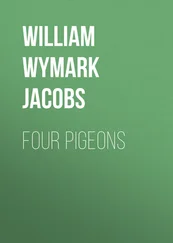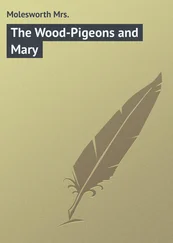Fahd turned on his right side and peered at Saeed, who had fallen silent for a moment, staring at the ceiling.
‘If my grandfather had twins, my father and my uncle I mean, shouldn’t the government have taken care of him?’
Fahd gave a noisy laugh and said slyly, ‘But they were local twins. They don’t count: you have to be a foreigner. Unless your father’s eyes were blue, that is, that might work. It’s so our country becomes global and can pass on its scientific achievements to all the countries of the world.’
Saeed sat up in bed.
‘Anyway, it’s nine already. That was a nap and a half. Shall we get some fresh air in Tahliya?’
Fahd lifted his silenced phone from the table between the two beds and looked at the screen. There were seven messages waiting for him. Alarmed, he said, ‘Seven messages. Some good morning that is.’
Saeed cackled from the flat’s only bathroom. ‘What do you mean, morning? People are getting ready to go to bed.’
When he emerged, a nervous Fahd played him one of the messages:
‘So you’re not happy with me, as you put it … Well, some day I’ll settle my account with you … It’ll be savage, because I’m out of my mind and wounded and betrayed and I’m sure you know what happens to a woman when she feels betrayed … She becomes a lion!’
‘Who’s that?’ said Saeed anxiously. ‘Don’t tell me it’s the Hejaz one?’
Fahd nodded his head.
— 31 —
AS FAHD CLIMBED INTO the Committee’s vehicle that morning he wondered whether Thuraya was behind what had happened. On several occasions she had threatened to take her revenge if he didn’t respond to her desires. Had she reported the sea-blue Hyundai Accent? Had she told them that it was a car like a blue wave adrift in an arid desert? Had she taken down the number plate when she came out of the entrance of Iman Hospital that time, or as she left the World of Dreams hair salon? Had Tarfah’s old boyfriend wanted to revenge himself on her and been stalking her, his mind filled with suspicion? Had it been the uncle who hated him and thought of him as a shameless sinner?
He often thought of his arrest as he walked out alone along Great Yarmouth’s sandy shoreline and saw the lovers stretched out beneath the little bushes, whispering together, or embracing, still as stones, for hours on end. How hard it was for him to recall a passage from one of the three books his father had left behind in his bag, which discussed the societies of the jahiliya . The passage described how the writers, journalists and novelists in these societies openly told their young women and wives that … there is nothing morally repugnant about conducting free relations. Immorality is when a young man deceives his girlfriend or a young woman her boyfriend and does not keep her affection solely for him. Indeed, it is immoral for a wife to remain celibate once desire for her husband has died down, and virtue is when she seeks out a friend to whom she can safely entrust her body! There are dozens of stories with this message at their core and hundreds of educational programmes, cartoons, jokes and comedies that promote it…
Had the hand that drew the wavering blue line beneath these words in Milestones really been shaking as it seemed? Was it his father’s hand? Was it some sign, something his father wanted to keep before him at all times? Was it really some precocious and successful attempt at prophecy?
In recent days Fahd had opened the leather satchel, stuffed with documents and diaries, stories and memories, specialist books and picture books, secret pamphlets, pens, the olive stone prayer beads and a picture — how it had been taken and by whom he had no idea — showing his father and fellow inmates in the prison yard. These mementoes of his father had yet to claim his attention, with the exception of the green volume, a black line across the middle of the cover and on the first page a title in thulathi script that read Milestones with the name Sayyid Qutb in beautiful farsi typeface in the top right corner, then the words Dar Dimashq Publishing . The handwriting inside was in his father’s hand, notes in the margins written long ago.
Back then his father, or perhaps just the author, believed that all societies existed in jahiliya , a state of godless ignorance, and were either … atheistic communist societies, pagan societies in India, Japan, the Philippines and Africa, or Christian and Jewish societies that followed their deviant creeds.
Within this definition of jahiliya societies he included those that professed to be Muslim, but in fact submitted to an authority other than God. It was as though the words in the book Fahd leafed through were being uttered by his cousin Yasser. Was this the well from which his father, his uncle and Yasser had all drunk? The common source for all those that followed the call to wage war on society, to the extent that some of them abandoned their normal lives and took up residence in ghettos for their kind?
Haraa Sharqiya on the outskirts of Mecca, the neighbourhood where the families of the Divine Reward Salafist Group lived, was little more than a chaotic assemblage of houses and buildings, between which ran exceptionally narrow alleys like cattle pens, scarcely wide enough for two people to pass at the same time. Their homes were ferro concrete structures with three doors. The rear entrance of each house led directly to the front door of the house behind it, and was commonly used by the women to meet, hold whispered conversations and swap favours and cooking ingredients — they were also the doors through which many of them fled during the raids carried out by the security services shortly before the occupation of the Grand Mosque.
Suleiman al-Safeelawi was brave and reckless, returning at night with rare courage to a neighbourhood under surveillance and making his way inside via the back door that opened on to the whip-thin alleyway, to rescue his bag containing his proofs of identity — his ID documents and certificates from primary and secondary school — before slipping away while the detectives and soldiers stood watch over the front doors.
He could hear his own heart thudding as he crept to the house of the group’s leader, silent as a butterfly as he passed through the darkness to the men’s majlis where he slept at night, to find his bedding folded up as he had left it and beside it his black leather satchel. He picked it up without opening it and, fleeing to the cattle pen behind the house, made his way out of the sprawling district, most of whose modest dwellings housed members of the group — Brothers as they called themselves — along with a few students from the Islamic University.
That moment, back at the time of the second wave of arrests and now sunk in dread and silence and forgetting, did not permanently distance young Suleiman from the group. Even so, he began to attend lessons with the blind sheikh at Imam Mosque in Deira in the company of a young man of a similar age, before being joined by a third student, then a fourth. The group’s military commander sent a messenger to warn against keeping company with government sheikhs lest they draw attention to themselves, unaware that the young men had grown impatient with the group and its impetuosity. Nevertheless, when Suleiman met Mushabbab that afternoon outside the Kutub Watania publishing house he almost flew with joy to learn that the leader was asking after him and expected him to arrive on the tenth of Ramadan; joy, because the leader’s eye only singled people out if he had confidence in them, when their abilities and talents set them apart from the rest.
So Suleiman travelled to see him at a farm in the village of Ammar, west of Riyadh, where some of the Brothers were gathered. The leader took him by the hand and led him to a long narrow room like a corridor and showed him the red string onion bags packed with yellow pamphlets that bore the title of his first message to the umma: Correcting Confusion over the Faith of he whom God Has Made Imam over All People . It was only once Suleiman had driven the bags to their destination that he actually read the contents of this message, at a little house in Mecca, where the leader of the Meccan Brothers, entrusted with handing out the pamphlets in the Grand Mosque, was staying. It was the night of the twenty-seventh of Ramadan.
Читать дальше












